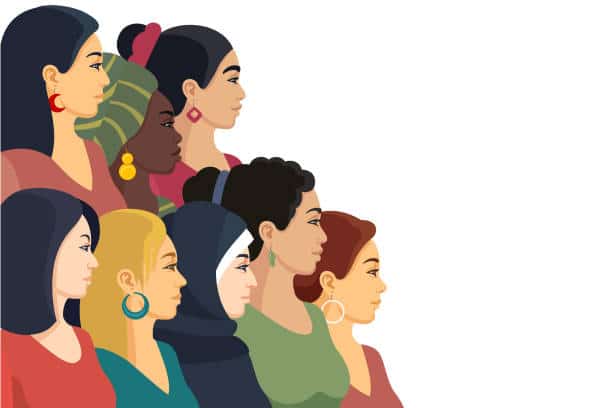The study of Islamic perspectives is one area where gender equality is still receiving attention in the global setting. Islam offers a solid theoretical basis for equality among its adherents, but putting it into practice can be difficult due to cultural differences, customs, and how sacred scriptures are interpreted.
This article will look at a number of issues pertaining to women’s equality from an Islamic standpoint, These are some examples of how gender equality is practiced in Islam:
Education access is a key component of women’s equality
Islam, in theory, promotes the value of knowledge for all of its adherents, regardless of gender. But in reality, there are still places where women face barriers to receiving a good education. Obstacles to this equality frequently include regional customs, unequal resource distribution, and misinterpretation of Islamic doctrines.
Islam gives women the opportunity to actively participate in leadership roles on both a micro and macro level, yet social reality frequently does not match this (Zainal Abidin, 2015).
Regarding women’s leadership potential
stigmas and preconceptions persist throughout society. This makes it difficult for women to actively participate in the formulation of public policy and decision-making.
The inheritance
dispute rights is a touchy subject when talking about gender equality in Islam. While Islamic law offers rules for equitable inheritance distribution between men and women, actual practice in this area frequently varies. There are numerous instances where sisters inherit less than brothers do.
The main causes of this injustice are frequently cultural factors, patriarchal practices, and a lack of understanding of Islamic teachings. There is frequently debate regarding how Islamic law should be applied in relation to gender roles.
Baca Juga: Perempuan Memiliki Hak yang Sama dengan Laki-Laki dalam Dunia Kerja
Even while Islamic law
in theory, treats men and women equally, in fact, injustice can arise from a variety of inconsistent and varied interpretations. Situations like child marriage, divorce, and the imposition of penalties frequently give rise to concerns over gender equality. under the framework of Islamic law.
In addition to religious doctrine, cultural and customary norms have a significant impact on how society regards gender equality. Some cultural customs, like excluding women from entering public areas, unfair polygamy, and the repression of women’s rights in the social and economic spheres, run counter to Islam’s egalitarian beliefs.
The idea of gender equality is acknowledged as an essential component of religious ideals in Islamic teachings. Men and women are equal before Allah, according to the Qur’an, and a person’s gender should not be used to determine their worth or dignity (QS. Al-Hujurat: 13).
This demonstrates that women have the same rights as males in the workplace, in the classroom, and when it comes to leadership and decision-making. Although Islamic teachings explicitly emphasize the principle of equality, its application frequently deviates from expectations.
The Islamic perspective holds that cultural variables, customs, and the interpretation of sacred scriptures present the greatest obstacles to establishing gender equality. Certain Muslim societies maintain cultural norms and traditions that are patriarchal and incompatible with The growth of women can be significantly impeded by the concepts of equality.
In Muslim societies, gender equality is greatly aided by education. The cornerstone of societal change is education that enables women to realize their full potential and offers a genuine comprehension of inclusive Islamic teachings.
Educating oneself on Islamic women’s rights, such as the rights to work, education, and public engagement, is the first step towards promoting gender equality. Achieving gender equality also requires empowering women in leadership roles.
Islam gives women the freedom to actively participate in a variety of spheres, such as politics, business, and society. Fostering women’s involvement in decision-making, fostering leadership qualities, and fostering an inclusive atmosphere for women in a variety of These are crucial measures to guarantee that gender equality is implemented in actual life.
From an Islamic standpoint, multiple stakeholders must work together to address the issue of gender equality, including the government, local organizations, religious authorities, and people. (Mazaya, 2014)
To do this, practical measures like enacting legislation to guarantee the protection of women’s rights, putting inclusive education programs into place, and raising awareness of the significance of gender equality in Islam can be adopted.
Baca Juga: Pentingnya Pendidikan bagi Perempuan untuk Mencapai Kesetaraan dalam Perspektif Mary Wollstonecraft
The advancement of gender equality in society is greatly aided by education. To enable women in the political, social, and economic spheres, it is crucial to invest in comprehensive and fair education for them from elementary through secondary school.
Gender disparity can be addressed with the aid of education that promotes women’s active engagement in public life and offers a correct understanding of inclusive Islamic teachings. According to the Islamic perspective, one of the prerequisites to attaining gender equality is the economic empowerment of women.
Women’s involvement in the economy can be raised with the aid of initiatives that strengthen their capacity for entrepreneurship, skill development, access to business funding, and networking opportunities. In addition to boosting women’s financial independence, this will help the economy as a whole flourish. (Anggoro, 2019)
Growing knowledge of Islamic women’s rights and accurate comprehension of the tenets promoting gender equality in religious teachings are crucial first steps in the fight.
Stereotypes and stigma against women in society can be lessened with the support of inclusive religious education programs and interfaith discussions that foster tolerance and understanding amongst people. In order to create an inclusive environment for women, legal reforms and public policies that encourage gender equality are critical first steps.
This involves taking action to end legal discrimination, safeguarding women’s rights, and applying the law equitably when it comes to instances where women’s rights are violated. Encouragement is also required for women to participate more in political decision-making.
From an Islamic standpoint, empowering women in leadership roles is crucial to advancing gender equality. Promoting women’s active involvement in leadership roles in the corporate, social, and political spheres will support constructive societal transformation. It also serves as an inspiration for women in the younger generation to follow their goals of achievement and positive influence.
Penulis: Najwa Syarifah
Mahasiswa Pendidikan Bahasa Arab Universitas Muhammadiyah Prof. DR. Hamka
Editor: Ika Ayuni Lestari
Bahasa: Rahmat Al Kafi
Ikuti berita terbaru di Google News
References
Anggoro, T. (2019). Konsep Kesetaraan Gender Dalam Islam. Afkaruna, 15(1), 129–135. https://doi.org/10.18196/aiijis.2019.0098.129-134
Mazaya, V. (2014). Kesetaraan Gender Dalam Perspektif Sejarah Islam. Sawwa: Jurnal Studi Gender, 9(2), 323. https://doi.org/10.21580/sa.v9i2.639
Zainal Abidin. (2015). Kesetaraan Gender dan Emansipasi Perempuan dalam Pendidikan Islam. Jurnal Ilmu Pendidikan, 12(01), 2–3.















